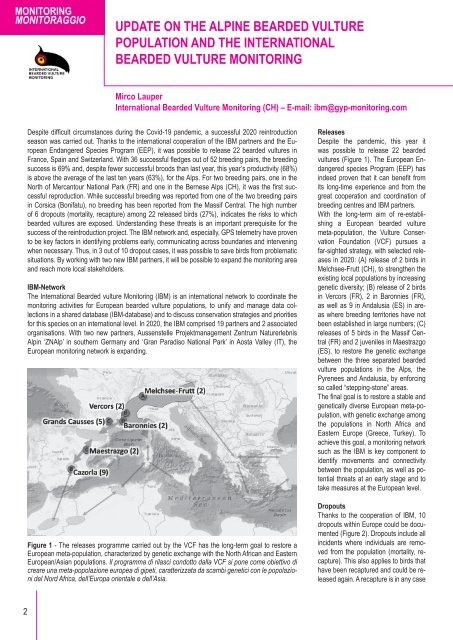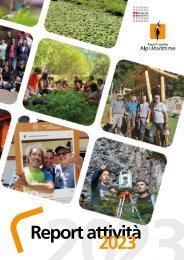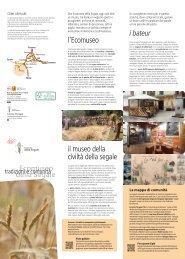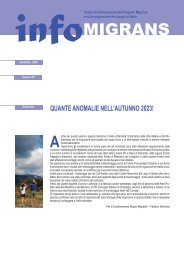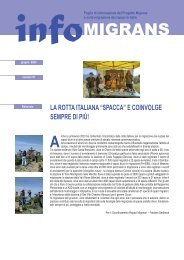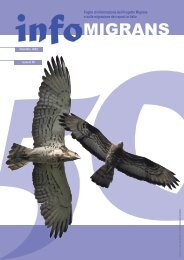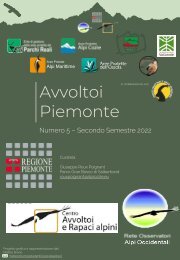infoGIPETO n.37 |dicembre 2020
Periodico d'informazione sul progetto di reintroduzione del gipeto.
Periodico d'informazione sul progetto di reintroduzione del gipeto.
You also want an ePaper? Increase the reach of your titles
YUMPU automatically turns print PDFs into web optimized ePapers that Google loves.
MONITORING<br />
MONITORAGGIO<br />
UPDATE ON THE ALPINE BEARDED VULTURE<br />
POPULATION AND THE INTERNATIONAL<br />
BEARDED VULTURE MONITORING<br />
Mirco Lauper<br />
International Bearded Vulture Monitoring (CH) – E-mail: ibm@gyp-monitoring.com<br />
Despite difficult circumstances during the Covid-19 pandemic, a successful <strong>2020</strong> reintroduction<br />
season was carried out. Thanks to the international cooperation of the IBM partners and the European<br />
Endangered Species Program (EEP), it was possible to release 22 bearded vultures in<br />
France, Spain and Switzerland. With 36 successful fledges out of 52 breeding pairs, the breeding<br />
success is 69% and, despite fewer successful broods than last year, this year’s productivity (68%)<br />
is above the average of the last ten years (63%), for the Alps. For two breeding pairs, one in the<br />
North of Mercantour National Park (FR) and one in the Bernese Alps (CH), it was the first successful<br />
reproduction. While successful breeding was reported from one of the two breeding pairs<br />
in Corsica (Bonifatu), no breeding has been reported from the Massif Central. The high number<br />
of 6 dropouts (mortality, recapture) among 22 released birds (27%), indicates the risks to which<br />
bearded vultures are exposed. Understanding these threats is an important prerequisite for the<br />
success of the reintroduction project. The IBM network and, especially, GPS telemetry have proven<br />
to be key factors in identifying problems early, communicating across boundaries and intervening<br />
when necessary. Thus, in 3 out of 10 dropout cases, it was possible to save birds from problematic<br />
situations. By working with two new IBM partners, it will be possible to expand the monitoring area<br />
and reach more local stakeholders.<br />
IBM-Network<br />
The International Bearded vulture Monitoring (IBM) is an international network to coordinate the<br />
monitoring activities for European bearded vulture populations, to unify and manage data collections<br />
in a shared database (IBM-database) and to discuss conservation strategies and priorities<br />
for this species on an international level. In <strong>2020</strong>, the IBM comprised 19 partners and 2 associated<br />
organisations. With two new partners, Aussenstelle Projektmanagement Zentrum Naturerlebnis<br />
Alpin ‘ZNAlp’ in southern Germany and ‘Gran Paradiso National Park’ in Aosta Valley (IT), the<br />
European monitoring network is expanding.<br />
Figure 1 - The releases programme carried out by the VCF has the long-term goal to restore a<br />
European meta-population, characterized by genetic exchange with the North African and Eastern<br />
European/Asian populations. Il programma di rilasci condotto dalla VCF si pone come obiettivo di<br />
creare una meta-popolazione europea di gipeti, caratterizzata da scambi genetici con le popolazioni<br />
del Nord Africa, dell’Europa orientale e dell’Asia.<br />
Releases<br />
Despite the pandemic, this year it<br />
was possible to release 22 bearded<br />
vultures (Figure 1). The European Endangered<br />
species Program (EEP) has<br />
indeed proven that it can benefit from<br />
its long-time experience and from the<br />
great cooperation and coordination of<br />
breeding centres and IBM partners.<br />
With the long-term aim of re-establishing<br />
a European bearded vulture<br />
meta-population, the Vulture Conservation<br />
Foundation (VCF) pursues a<br />
far-sighted strategy, with selected releases<br />
in <strong>2020</strong>: (A) release of 2 birds in<br />
Melchsee-Frutt (CH), to strengthen the<br />
existing local populations by increasing<br />
genetic diversity; (B) release of 2 birds<br />
in Vercors (FR), 2 in Baronnies (FR),<br />
as well as 9 in Andalusia (ES) in areas<br />
where breeding territories have not<br />
been established in large numbers; (C)<br />
releases of 5 birds in the Massif Central<br />
(FR) and 2 juveniles in Maestrazgo<br />
(ES), to restore the genetic exchange<br />
between the three separated bearded<br />
vulture populations in the Alps, the<br />
Pyrenees and Andalusia, by enforcing<br />
so called “stepping-stone” areas.<br />
The final goal is to restore a stable and<br />
genetically diverse European meta-population,<br />
with genetic exchange among<br />
the populations in North Africa and<br />
Eastern Europe (Greece, Turkey). To<br />
achieve this goal, a monitoring network<br />
such as the IBM is key component to<br />
identify movements and connectivity<br />
between the population, as well as potential<br />
threats at an early stage and to<br />
take measures at the European level.<br />
Dropouts<br />
Thanks to the cooperation of IBM, 10<br />
dropouts within Europe could be documented<br />
(Figure 2). Dropouts include all<br />
incidents where individuals are removed<br />
from the population (mortality, recapture).<br />
This also applies to birds that<br />
have been recaptured and could be released<br />
again. A recapture is in any case<br />
2


